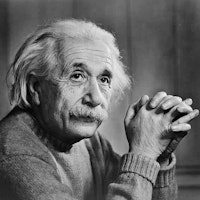To this there also belongs the faith in the possibility that the regulations valid for the world of existence are rational… I cannot conceive of a genuine scientist without that profound faith. The situation may be expressed by an image: science without religion is lame, religion without science is blind.
To this there also belongs the faith in the possibility that the regulations valid for the world of existence are rational… I cannot conceive of a genuine scientist without that profound faith. The situation may be expressed by an image: science without religion is lame, religion without science is blind.
Albert Einstein

Science Without Religion
Topic: Wisdom & Understanding
“Now, even though the realms of religion and science in themselves are clearly marked off from each other, nevertheless there exist between the two strong reciprocal relationships and dependencies. Though religion may be that which determines the goal, it has, nevertheless, learned from science, in the broadest sense, what means will contribute to the attainment of the goals it has set up. But science can only be created by those who are thoroughly imbued with the aspiration toward truth and understanding. This source of feeling, however, springs from the sphere of religion. To this there also belongs the faith in the possibility that the regulations valid for the world of existence are rational, that is, comprehensible to reason. I cannot conceive of a genuine scientist without that profound faith. The situation may be expressed by an image: science without religion is lame, religion without science is blind.“
Albert Einstein, born on 14 March 1879 and passing away on 18 April 1955, stands as one of the most renowned theoretical physicists in history. Best known for his groundbreaking special and general theories of relativity, his scientific endeavors spanned a multitude of areas within the field of physics. Amongst his numerous accolades, he was awarded the Nobel Prize in physics for his elucidation of the photoelectric effect—a phenomenon that expanded the horizons of quantum theory.
Einstein's journey, however, wasn't merely defined by scientific discoveries, but by the myriad challenges he overcame across various dimensions of his life. In his spiritual journey, he grappled with the concepts of God and universe. Socially, he navigated the complexities of his time—facing the rise of anti-Semitism, experiencing exile from his homeland due to Nazi oppression, and advocating for civil rights, disarmament, and global peace. These adversities only strengthened his resolve and underscored his resilience.
Beyond his professional accomplishments, Einstein's life was enriched by a tapestry of relationships and dialogues with luminaries from diverse fields. He engaged in profound conversations on the nature of reality with the likes of the Indian poet Rabindranath Tagore, discussed the principles of non-violence with Mohandas Gandhi, and deliberated on humanitarian issues with Albert Schweitzer. Furthermore, his camaraderie with fellow scientists and physicists provided a fertile ground for intellectual exchanges, fostering an environment of collaboration and innovation during one of the most exciting epochs in scientific history.
The World as I See It
Wilson, Andrew, editor. World Scripture II. Universal Peace Federation, 2011, p 713 [Albert Einstein, The World as I See It].

Albert Einstein
Copyright © 2017 – 2026 LuminaryQuotes.com About Us

Albert Einstein, Additional Quotes
“The search for knowledge is incumbent upon everyone. Education and diligent study elevates and ennobles the human person. Four aspects of the search for knowledge are: First, the search for truth is a religious obligation, and the search takes us back to the Source of the universe from whence comes all truth. Second, an important aspect of learning is to examine oneself. This includes recognizing the extent of our ignorance—how little we know. Third, knowledge is not handed to us, but requires us to comprehend a topic and make it our own. Therefore the student makes thorough efforts to understand the matter from all angles. Fourth, the search should be broad, embracing all religions and cultures, including all the sciences.”
— Albert Einstein [The World as I See It (Philosophical Library, New York, 1949)] pp. 24 – 28.
“A human being is part of the whole, called by us ‘universe,’ a part limited in time and space. He experiences himself, his thoughts and feelings, as something separate from the rest–a kind of optical delusion of consciousness. The striving to free oneself from this delusion is the one issue of true religion. Not to nourish the delusion but to try to overcome it is the way to reach the attainable measure of peace of mind.”
–Albert Einstein [Naomi Levy, Einstein and the Rabbi: Searching for the Soul, MacMillan (a letter to Rabbi Robert S. Marcus)] pp. 22-23.